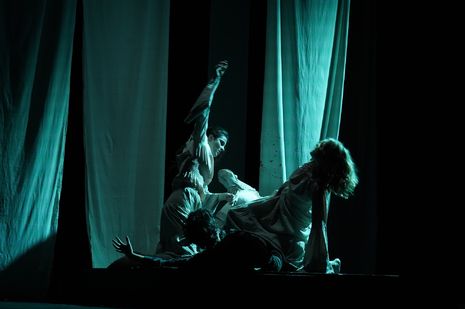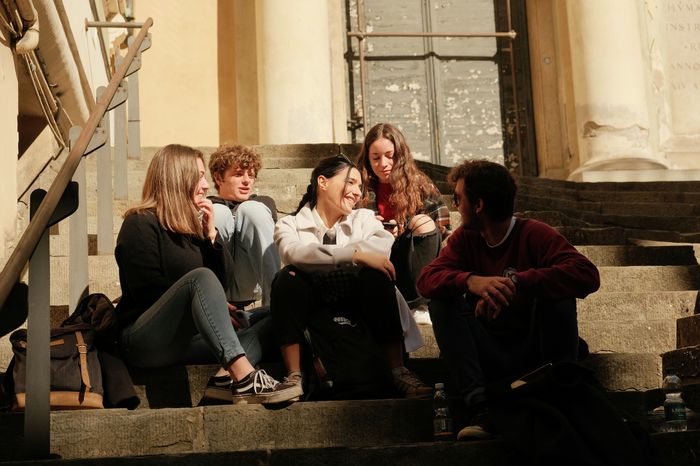Macbeth makes a tragedy of the body itself
Macbeth is a visceral triumph, says Hana Preston

The room fades to blue darkness. It’s never easy to predict how – or even if – a theatre company will choose to approach Shakespeare from a new angle, especially when it comes to one of his grisliest, most famous of plays. It’s a relief, then, how quickly my questions are answered by the emergence of Amie Brian’s tortured Lady Macbeth from a backdrop of pale, twisting sheets. Light and sound swell in and out; her silhouette is a shuddering thing, writhing upon a central dais until she finally begins to howl.
The product of her agony – a stillborn child – is lifted before the audience. Instantly, explicitly, this production predicates itself on a foundation of agonising physical violence, the body materially platformed as a vehicle for exposure, vulnerability, death. Between this unprecedented first scene and the ever-present bloodstain spattered across one of the hanging sheets, its messaging is almost too on the nose. The tragic nuance of Lady Macbeth’s desperation to reproduce is somewhat lost to the prerequisite for spectacle in modern-day Shakespeare productions but, as far as novelty goes, Maisie Johnson’s Macbeth very much strikes home so far.
“Lady Macbeth’s liquid sensuality is a force which Macbeth is visibly desperate to chase”
The physical chemistry between Griso’s Macbeth and Brian’s Lady Macbeth is one of the highlights of the performance. Everything returns to the corporeal and so, fittingly, does the relationship between them: Macbeth first appears to his wife from between the draped sheets and for a moment both are arrested, Brian’s expression invisible to the audience as Griso beams from his place behind her before the two at last come together. Lady Macbeth’s liquid sensuality is a force which Macbeth is visibly desperate to chase, his striding movements suddenly almost wooden when compared to the way his wife chooses perfect moments to slink across the stage.
Later, once Duncan has been murdered, this sensuality is only expounded: the two come together as if magnetised, drawn towards one another by the blood which stains both their hands. The scene is erotic and depraved in equal measure, the audience is hypnotised as Macbeth reaches past his wife’s white nightdress to smear his blood-soaked fingers to her face – and she his. In a performance foregrounded by Lady Macbeth’s devastating maternal grief, Griso and Brian do an incredible job of staging their characters’ consequent, terrifying intimacy, each responding to the other’s every shift in a way which perfectly defines this relationship as closer in ruin than anywhere else.
“The witches are an endless tangle of limbs, symbiotic and horrifying”
The body remains vital to the production throughout. Understated stage-setting and Helen Lyster and Abi Beton’s simple, effective costumes make it obvious from the start that physicality will be a core tenet of the play’s impact, and no actor disappoints. Swords glint in the low light, teeth flash, blood gleams. The witches (Kate Woodman, Daisy Bates, and Tabby MacLachlan) are an endless tangle of limbs, symbiotic and horrifying, uncanny vocal unison only elevated by their preternatural animation as one. Griso is equally stunning in the role of Macbeth, every movement calculated as he shifts from the confident, upstanding Thane of Glamis into the haggard shell of a doomed king. At various moments (most critically, the famous dagger monologue) Jasper Harris lights the man like a skeleton, Macbeth’s face a gaunt skull, eyes invisible in their sockets as he sinks so far down to the stage that his worship of the blade begins to resemble prayer.
Macbeth begins the play with his torso clothed in just a sleeveless leather vest, his bare skin stained all over with both blood and dirt. Only when cloaked in the security of the witches’ fulfilled prophecy does he gain an undershirt – a clear new layer of armour, protecting him for a time from the brutality of a performance where no distinction is ever made between violence and mere touch. When Griso’s Macbeth finally puts on the crown, the transformation is immediate: cued by Sound Designer Barash Tunahan, a low, trembling violin begins to echo through the theatre the moment the crown touches his head; he steps forward and, instantly, half his face vanishes into shadow.
“This Macbeth falls victim less to the powers of fate and prophecy which reign in other performances, and more to the flaws of his own body, his weakness”
His is also the only major onstage costume change: the play’s end sees him tearing off shirt and crown alike, baring himself once more to whatever forces await him. This Macbeth falls victim less to the powers of fate and prophecy which reign in other performances, and more to the flaws of his own body, his weakness, his “fruitless crown” as established brutally in the very first scene. Macbeth, crucially, is strangled rather than stabbed or beheaded; physical contact delineates the very fact of his death, limbs twitching as Macduff – brought to life as fierce, stoic executioner by Ben Sibbald – chokes the life from the man beneath him.

The importance of the post-theatre debrief
This is a production where violence alone manages to catch the light. A bloody sheet drapes in full view for the entire play, a powerful (if, again, slightly obvious) manifestation of the gore within which the tragedy is saturated; Banquo’s death is marked by an explosion of scarlet across the stage. The unassuming dais which sits in centre-stage becomes a site of endless, terrible conflict – in its time it platforms the birth of a stillborn infant, a doomed coronation, a gruesome regicide, three maddened witches, a blood-soaked union, a murdered ghost. Craven fear sits at the heart of the performance. Despite already having witnessed countless productions of ‘the Scottish play’, I found myself on the edge of my seat the entire time. The air in the theatre was utterly fraught throughout. With my only real criticism being the occasional tendency towards overstated visual metaphor, this remains easily one of the best portrayals of Macbeth I have seen.
 News / Judge Business School advisor resigns over Epstein and Andrew links18 February 2026
News / Judge Business School advisor resigns over Epstein and Andrew links18 February 2026 News / Gov grants £36m to Cambridge supercomputer17 February 2026
News / Gov grants £36m to Cambridge supercomputer17 February 2026 News / Union speakers condemn ‘hateful’ Katie Hopkins speech14 February 2026
News / Union speakers condemn ‘hateful’ Katie Hopkins speech14 February 2026 News / CUCA members attend Reform rally in London20 February 2026
News / CUCA members attend Reform rally in London20 February 2026 News / Right-wing billionaire Peter Thiel gives ‘antichrist’ lecture in Cambridge6 February 2026
News / Right-wing billionaire Peter Thiel gives ‘antichrist’ lecture in Cambridge6 February 2026









